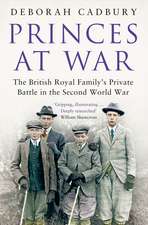British Intelligence and Hitler's Empire in the Soviet Union, 1941-1945
Autor Dr. Ben Wheatleyen Limba Engleză Paperback – 22 aug 2018
| Toate formatele și edițiile | Preț | Express |
|---|---|---|
| Paperback (1) | 238.22 lei 6-8 săpt. | |
| Bloomsbury Publishing – 22 aug 2018 | 238.22 lei 6-8 săpt. | |
| Hardback (1) | 773.81 lei 6-8 săpt. | |
| Bloomsbury Publishing – 25 ian 2017 | 773.81 lei 6-8 săpt. |
Preț: 238.22 lei
Preț vechi: 305.99 lei
-22% Nou
Puncte Express: 357
Preț estimativ în valută:
45.58€ • 47.59$ • 37.73£
45.58€ • 47.59$ • 37.73£
Carte tipărită la comandă
Livrare economică 05-19 aprilie
Preluare comenzi: 021 569.72.76
Specificații
ISBN-13: 9781350096813
ISBN-10: 1350096814
Pagini: 272
Ilustrații: 16 bw illus
Dimensiuni: 156 x 234 x 15 mm
Greutate: 0.39 kg
Editura: Bloomsbury Publishing
Colecția Bloomsbury Academic
Locul publicării:London, United Kingdom
ISBN-10: 1350096814
Pagini: 272
Ilustrații: 16 bw illus
Dimensiuni: 156 x 234 x 15 mm
Greutate: 0.39 kg
Editura: Bloomsbury Publishing
Colecția Bloomsbury Academic
Locul publicării:London, United Kingdom
Caracteristici
Highlights the significant role played by the FRPS/FORD in persuading the British government to peruse a post-war policy of cooperation with the emerging Soviet superpower
Notă biografică
Ben Wheatley is an Honorary Research Fellow in the Department of History at the University of East Anglia, UK.
Cuprins
IntroductionPrologue: British Pre-War Policy towards the Soviet Union and the Baltic States, 1917 - 1941PART I: The Restricted Services, British Covert Intelligence and Subterfuge in the Baltic States1. SIS, SOE and the NKVDPART II: The Central Role of British Open Source Intelligence in the Ostland2. The Importance of the Foreign Press to British Intelligence 1938 - 19413. The Stockholm Press Reading Bureau 4. The Foreign Research and Press Service Baltic States Section 1941 - 1942 5. The Foreign Office Research Department Baltic States Section 1943 - 1944PART III: Case Studies of the FRPS/FORD Baltic States Section's IntelligenceIntroduction to the Case Studies6. Economic Conditions in the Ostland 7. German Population Policy in the OstlandPart IV: Post-hostilities Planning 8. The Foreign Office Research Department and Post-hostilities Planning Conclusion Endnotes BibliographyIndex
Recenzii
This is an important study that examines a largely-ignored but significant piece of Second World War history. Ben Wheatley points out that intelligence gathering consists of far more than glamorous femme fatale spies and surreptitious document drops in parks, but is fundamentally the meticulous gathering of information from a wide range of sources. The importance of open source intelligence (OSINT) has often been neglected by scholars because it rarely fits the glamorous image of intelligence work made famous in novels and popular media, but as Wheatley observes it played a key role in understanding the German occupation of the Soviet Union and provided information that could not otherwise have been obtained for a variety of reasons. This is a work that deserves to be read by anyone interested in the intelligence battles that took place behind closed doors during the Second World War and the British struggle to gather reliable information under some of the most difficult political circumstances imaginable.
British Intelligence and Hitler's Empire in the Soviet Union moves intelligence history off the beaten track in two very interesting ways: first it takes the reader to the ghastly Reichskommissariat Ostland; secondly it demonstrates that Britain was not merely spying on its enemies, it was taking pains to understand them.
In this absorbing account Dr Wheatley shines new light on a previously unknown aspect of the secret war between Britain and Nazi Germany. Here, for the first time, is a detailed description of the open source intelligence war that was being waged in tandem with the secret war. I highly recommend it.
A significant and stimulating contribution that widens our understanding of the clandestine conflict between Britain and Hitler's Germany.
British Intelligence and Hitler's Empire in the Soviet Union moves intelligence history off the beaten track in two very interesting ways: first it takes the reader to the ghastly Reichskommissariat Ostland; secondly it demonstrates that Britain was not merely spying on its enemies, it was taking pains to understand them.
In this absorbing account Dr Wheatley shines new light on a previously unknown aspect of the secret war between Britain and Nazi Germany. Here, for the first time, is a detailed description of the open source intelligence war that was being waged in tandem with the secret war. I highly recommend it.
A significant and stimulating contribution that widens our understanding of the clandestine conflict between Britain and Hitler's Germany.













